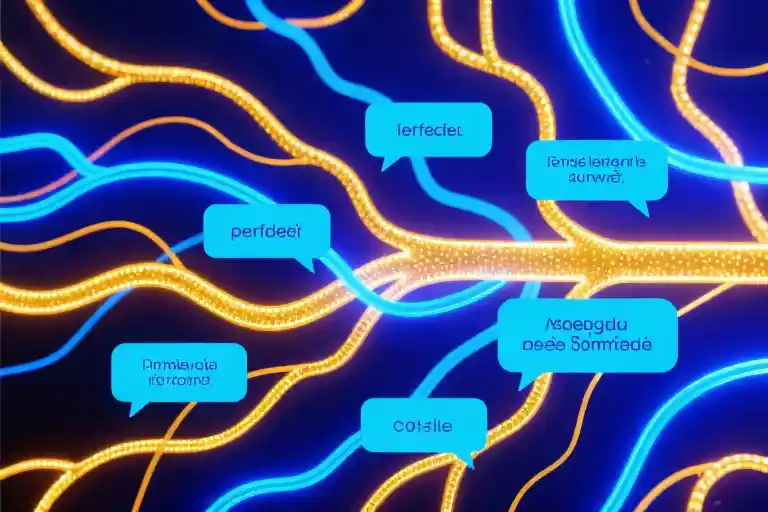The phone screen glows blue in the darkness, illuminating your face with its cold light. A new message appears: “I love you.” Three words you’ve waited a lifetime to hear, yet when they finally come, they settle on your skin like morning dew—present, but never penetrating. You trace the letters with your thumb, waiting for that familiar warmth to spread through your chest. But nothing comes.
Love shouldn’t feel this lonely.
Outside, rain taps against the window in uneven rhythms, each drop hitting the glass only to slide away without leaving a mark. You watch them disappear one by one, wondering why affection—like rainwater—can surround you completely yet never quite soak in. The bedroom feels suddenly too large, the silence between heartbeats too loud. Somewhere beneath your ribs, a quiet question forms: Why does being loved sometimes feel like being stranded in a country where you don’t speak the language?
You’ve played this scene before—the careful smile, the automatic “I love you too” whispered back like a well-rehearsed line. Everyone tells you this is how love works: words exchanged, touches given, promises made. But no one warns you about the hollow space that grows when the love you receive doesn’t match the love you understand. It’s not that the feeling isn’t real; it’s that the dialect is wrong.
Perhaps this explains the peculiar loneliness of modern relationships—that ache of being emotionally homesick while standing right next to someone who cares. You watch partners fluent in each other’s affection laugh over shared jokes, their love flowing as easily as breathing, while yours remains trapped behind glass. The more you try to force connection, the more it slips through your fingers like those raindrops on the window—visible, but ultimately untouchable.
What no one prepares you for is how exhausting it becomes to live in permanent translation. To constantly interpret acts of service as love when your heart craves words. To accept quality time when what you really need is physical touch. To smile gratefully at gifts while secretly yearning for deeper conversations. The mental subtitles you create to bridge the gap between their affection and your understanding eventually blur your vision, until you can’t remember what untranslated love even looks like.
Yet here’s the secret they don’t teach: Love isn’t supposed to require decoding. The right kind won’t leave you squinting at emotional hieroglyphics, trying to discern meaning from well-intentioned but foreign gestures. Real love speaks your mother tongue—not perfectly, but fluently enough that you never doubt its meaning. It’s the difference between reading a translated poem and hearing the original verses; both contain beauty, but only one carries the full weight of the author’s soul.
So tonight, as you stare at that glowing screen and the unanswered love it holds, remember this: Your longing isn’t greed. Your needs aren’t demands. That persistent ache isn’t evidence of your failure to appreciate love—it’s proof you know what real connection should feel like. Somewhere beyond this moment, beyond the mistranslations and well-meaning mismatches, exists a love that won’t require interpretation. One that will find you as naturally as morning light finds its way through an open window.
Until then, don’t let the rain convince you it’s the ocean.
When Love Feels Like a Foreign Language
You know that moment when someone says “I love you,” and it should feel like sunshine soaking into your skin—but instead, it rolls off like raindrops on a waxed jacket? You hear the words. You recognize their intention. Yet something essential gets lost in translation between their heart and yours.
This is the quiet ache of loving someone who speaks a different emotional dialect. They might show affection through:
- Acts of service: Remembering to refill your prescription but forgetting anniversary dates
- Physical touch: Constant hand-holding during movies when you crave deep conversations
- Gift-giving: Thoughtful presents that sit unopened because you needed presence more than packages
Research from the Gottman Institute shows 68% of relationship conflicts stem from mismatched emotional expression styles—not lack of love itself. You might experience this as:
- Performing expected responses (nodding when they share feelings, though it feels scripted)
- Overanalyzing their actions (“Was cooking dinner their way of apologizing?”)
- Self-editing your needs (not asking for verbal reassurance to avoid seeming “needy”)
Like trying to read a novel in a language you only half-understand, you grasp the general plot but miss the nuanced poetry between the lines. The more you love them, the louder this quiet disconnect becomes—until you start questioning your own emotional fluency.
But here’s what that lonely feeling doesn’t mean:
- ✖ That you’re incapable of love
- ✖ That they don’t genuinely care
- ✖ That your relationship is doomed
It simply means you’re standing at the intersection where two authentic but different love languages meet. The good news? Recognizing this disconnect is the first step toward either finding common ground or realizing you deserve someone who speaks your heart’s native tongue.
The Five Dialects of Love
Love speaks in many tongues. Some are loud and lyrical, others quiet as morning light. The disconnect happens not when love is absent, but when two people express it in fundamentally different vocabularies. These are the unrecognized dialects of affection that leave even thriving relationships feeling strangely parched.
The Verbalists: Midnight Confessions
For verbal love speakers, words aren’t mere containers—they’re living things. “I love you” holds weight. Vulnerable 3 AM conversations about childhood wounds or existential fears become sacred rituals. A perfectly timed “How was your presentation?” can feel more nourishing than breakfast in bed.
Yet this dialect often gets mistranslated. Partners may dismiss late-night heart-to-hearts as “overthinking” or label emotional transparency as “needy.” The verbalist walks away feeling like their native tongue has been deemed too complicated, too messy—as if love should be simpler. But what’s simple about the human heart?
The Acts of Service Tribe
Their love language reads like a silent poem:
- The oil change done before you mention the weird engine noise
- Your favorite soup simmering when you’re down with flu
- Charged headphones placed in your work bag
For service speakers, these aren’t chores—they’re love letters in motion. But when their partner craves whispered affirmations or prolonged eye contact, these practical gestures can register as impersonal. “If they really loved me, they’d say it,” the thinking goes, overlooking the profound devotion in those folded laundry piles.
The Gift Givers
More than objects, these offerings are physical manifestations of “I thought of you.” Maybe it’s the seashell from their lunchtime walk because it matched your bedroom colors. Or the out-of-print book they tracked down after you casually mentioned loving it at sixteen.
Yet receivers sometimes misread this dialect as materialistic or performative—especially if their primary language is quality time. The gift giver watches their carefully chosen present received with polite confusion, the subtext (“I listen. I remember. You’re woven into my daily life.”) lost in translation.
The Touch Speakers
Their dialect lives in:
- The hand resting on your lower back in crowded elevators
- Playing with your hair during movie nights
- Foreheads touching after a hard day
For them, physical presence is the ultimate affirmation. But partners who grew up in less demonstrative households may misinterpret this as clinginess. A touch speaker reaching out post-argument might be offering their deepest apology, while the other perceives it as avoiding “real talk.”
The Quality Time Guardians
Undivided attention is their love currency. Not just being together, but being truly present—phones down, eyes up, laughing at the same pauses in conversation. Their hearts swell when you block off Saturday mornings for farmers’ market trips or suggest unplugged weekend getaways.
The rub? Partners who express love through service may see these activities as “unproductive.” Why linger over brunch when there’s laundry to fold? The time guardian feels their sacred dialect reduced to “loafing around.”
Which dialect makes your heart nod in recognition? The answer often lies in what you chronically crave or what childhood lacked. Those raised with sparse praise might blossom under verbal affirmation. Someone with unreliable caregivers may find profound safety in acts of service.
Here’s the liberating truth: no dialect is superior. The magic happens in mutual fluency—when both partners learn to appreciate their differences while meeting somewhere in the middle. Maybe your verbalist learns to see laundry as love poetry. Perhaps your service-oriented partner starts leaving Post-it notes by the coffee maker.
Because love shouldn’t be a decoding game. At its best, it’s two people saying, “Teach me your mother tongue, and I’ll teach you mine.”
You’re Not Failing at Love
That voice in your head whispers it when you stare at unanswered texts or swallow unspoken needs: Maybe I’m too difficult to love. The suspicion grows like ivy when your partner brings takeout after your terrible day (their attempt at comfort) while you ache for them to ask Tell me what hurts (your native language).
Here’s the truth your anxiety won’t admit: It’s not your fault the connection feels staticky. Love isn’t a standardized test where you’re scoring poorly—it’s more like tuning a radio to different frequencies. What sounds like perfect clarity to one person registers as white noise to another.
How We Learn Our Love Language
Your emotional vocabulary formed young. Maybe:
- Your father showed care through packed lunches with doodled napkins (gifts dialect)
- Your best friend said “I’m here” by sitting silently through your tears (presence dialect)
- Your first love whispered secrets in dark bedrooms (words dialect)
These early experiences built neural pathways for how you give/receive affection. When someone uses unfamiliar syntax (like replacing “I miss you” with doing your laundry), your brain literally struggles to process it as love.
Case Study: Emma (32) spent years believing she was “needy” for wanting verbal reassurance until therapy revealed:
- Raised by literary parents who quoted poetry to soothe her
- Her ex expressed love through acts of service (fixing her car, unasked)
- Mismatch ≠ lack of love, but like “a French speaker dating someone who only knows Mandarin”
The Translation Fatigue
Constantly interpreting unfamiliar love expressions is exhausting:
- Cognitive load: Deciphering “He cooked dinner” as “I care” requires mental gymnastics
- Emotional tax: Smiling at unwanted gifts while starving for quality time
- Self-erasure: Silencing your needs to accept their dialect breeds resentment
This isn’t sustainable. As researcher Dr. Elaine Ho observes: “The most resilient relationships share at least one fluent emotional language—not perfect translation.”
Rewriting the Narrative
Three mindset shifts to ease the self-blame:
- Different ≠ Defective
Your preference for handwritten letters over surprise vacations isn’t “high maintenance”—it’s your heart’s mother tongue. - Some Bilingualism Helps
While seeking partners who speak your primary love language, learning basic “phrases” in theirs builds bridges (e.g., appreciating their chore help as affection). - Compatibility > Compromise
Enduring 80% mistranslated love often harms more than leaving space for better-matched connections.
“I used to apologize for needing words,” writes poet Sylvia. “Now I see it like preferring tea over coffee—just a taste, not a test.”
The Waiting Myth
Waiting passively for a “perfect match” is unrealistic, but neither should you:
- Force fluency where none exists
- Betray your core needs for fear of loneliness
The middle path: clarity + patience. Know your non-negotiables (“I require verbal affirmation”), stay open to teaching/learning secondary languages, and trust discernment over desperation.
Because when love finally speaks your dialect? You’ll recognize it by the lack of subtitles.
When Love Finds Its Mother Tongue
There comes a moment—perhaps when you least expect it—when love stops feeling like a constant act of translation. Your partner remembers how you take your coffee without being told. They pause their podcast because they notice you’re about to speak. They laugh at your jokes before you finish delivering the punchline. These aren’t grand gestures, but in their quiet precision, they feel like finally hearing a familiar melody in a foreign land.
The Fluency of Being Understood
This is what it means when love speaks your language:
- Effortless comprehension: Their “good morning” text arrives just as you’re reaching for your phone
- Shared vocabulary: Your idiosyncratic phrases (“rain-check cuddles,” “emergency chocolate”) become part of their lexicon
- Natural rhythm: Silences feel comfortable rather than charged with unspoken expectations
Like rainfall finally penetrating parched earth, their affection reaches the hidden places in you that others’ love never touched. That childhood fear of abandonment? They soothe it without you explaining. Your need for verbal affirmation? They meet it without resentment.
Cultivating Bilingual Love
Even in relationships where partners speak different love languages initially, common ground emerges through:
- Attentive observation (“You always relax when I rub your shoulders—should I do that more?”)
- Creative compromise (Leaving Post-it notes if spoken words feel unnatural)
- Patient practice (Gradually learning each other’s emotional dialects)
Research on long-term couples shows shared meaning systems develop over time—what psychologists call “relational cultures.” Inside jokes, rituals, and private references become your unique dialect.
The First Untranslated Moment
You’ll recognize the shift by its unmistakable warmth:
- When their touch aligns perfectly with your unvoiced need
- When their apology comes in exactly the form you needed to hear
- When you realize you haven’t mentally “subtitled” their actions in weeks
Like seedlings breaking through once-impermeable soil, these moments signal roots taking hold. The love you once strained to comprehend now nourishes you effortlessly.
Not An Ending, But A Beginning
This isn’t about finding some mythical “perfect” partner. It’s about discovering someone willing to become fluent in you—and you in them. The work of love continues, but the exhausting labor of constant interpretation fades. What remains is something alive, growing, and gloriously specific to your shared world.
As the last metaphor dissolves into lived experience, you realize: you’re no longer waiting to be understood. You’re building a home where love needs no dictionary.
When Love Finds Its Mother Tongue
The most beautiful love stories aren’t about grand gestures or perfect moments. They’re about that quiet recognition when someone’s love doesn’t need subtitles in your heart. That moment when you realize: this person speaks you fluently.
We spend so much of our lives translating – decoding mixed signals, interpreting silences, explaining our needs like we’re submitting a formal request in triplicate. But real love? The kind that settles in your bones? It arrives pre-translated. It comes wearing your favorite color, humming your childhood lullaby, knowing exactly how you take your coffee without being told.
Love shouldn’t be a decoding game.
Tonight, try this simple exercise: take out a notebook and write down what love sounds like in your mother tongue. Not what magazines say it should be, not what your last relationship conditioned you to accept – but the specific ways love becomes real to you. Maybe it’s:
- When someone remembers your stories better than you do
- The particular way they say “drive safe” when you leave
- How they notice when you’re cold before you shiver
- That way they listen with their whole body turned toward you
These are your love language’s vocabulary words. This is the dialect your heart understands without an interpreter.
One remarkable thing happens when you become this clear about how you receive love: you stop accepting emotional static as connection. You develop an ear for authenticity. The people who genuinely care will lean in to learn your language. The ones who don’t? Their static will fade into background noise where it belongs.
So let this be your quiet promise tonight: no more settling for love that needs translation. No more pretending static is a song. The world is full of people who speak dozens of love languages – someone out there is fluent in yours.
Because here’s the secret they don’t tell you about “love languages” – they’re not just how you receive love, but how you give it too. When two people share the same mother tongue of the heart, every “I love you” lands exactly where it’s meant to. No subtitles needed.
Love, when it finds its mother tongue, feels less like rain on pavement and more like roots finally reaching water.





